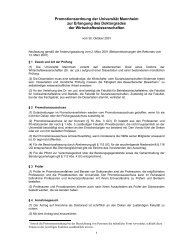Modulkatalog - Abteilung VWL - Universität Mannheim
Modulkatalog - Abteilung VWL - Universität Mannheim
Modulkatalog - Abteilung VWL - Universität Mannheim
Erfolgreiche ePaper selbst erstellen
Machen Sie aus Ihren PDF Publikationen ein blätterbares Flipbook mit unserer einzigartigen Google optimierten e-Paper Software.
Voraussetzungen für die<br />
Vergabe von ECTS-<br />
Punkten und Benotung<br />
Modulverantwortliche/r Prof. Dr. Martin Peitz<br />
Weitere Lehrende Übungsleiter<br />
Therefore, graduates will be able to exchange information, ideas, and<br />
solutions both with experts of the field (using models, maths and jargon)<br />
and with laymen (in plain English).<br />
Finally, this course is taught in English, and graduates therefore acquire a<br />
profound knowledge of the English terminology in the field of industrial<br />
organization.<br />
Midterm examination (90 minutes, 30% of the final grade)<br />
Final examination (135 minutes, 70% of the final grade)<br />
Titel des Moduls Information and Incentives I<br />
Art und Verwendbarkeit<br />
des Moduls<br />
Dauer des Moduls 1 Semester<br />
ECTS-Punkte 6<br />
Wahlveranstaltung im Bachelorstudiengang Volkswirtschaftslehre; ggf.<br />
Wahlveranstaltung in zahlreichen anderen Bachelorstudiengängen der<br />
<strong>Universität</strong> <strong>Mannheim</strong><br />
Lehrmethode Vorlesung (2 SWS) plus Übung (1 SWS)<br />
Arbeitsaufwand Präsenzzeit Vorlesung: 21 Stunden, Präsenzzeit Übung: 10,5 Stunden, Zeit<br />
für Selbststudium, Klausurvorbereitung und Klausur: 148,5 Stunden<br />
Turnus des Angebots Herbstsemester 2010<br />
Zahl der<br />
Teilnehmer/innen<br />
Unterrichtssprache Englisch<br />
Teilnahmevoraussetzungen<br />
Ziele und Inhalte des<br />
Moduls<br />
abhängig von den Wahlentscheidungen im Spezialisierungsbereich<br />
Mikroökonomik A und B<br />
In this course, we focus on two-sided interactions in which one part has<br />
more information than the other part. Our goal is to examine the<br />
consequences of such an information gap on the character and efficiency<br />
of the interaction and analyse the general structure of incentive problems<br />
that arise. After an introduction to the broad subject of asymmetric<br />
information, we will first present a benchmark model in which both parties<br />
share the same information and how to represent it rigorously. Next, the<br />
course will be divided into four parts devoted respectively to<br />
1. The Treatment of Games of Incomplete Information<br />
2. Strategic Information Transmission in Games<br />
3. Moral Hazard Basic Models and<br />
4. Adverse Selection Basic Model.<br />
38















